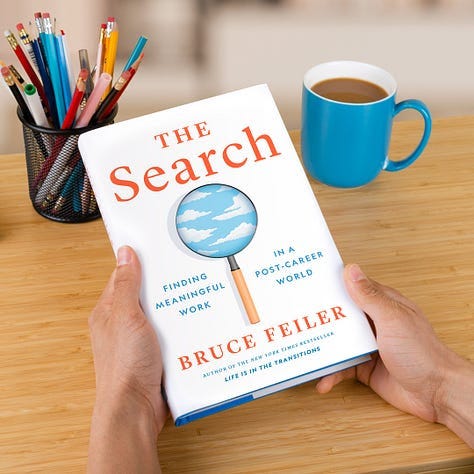If you’ve been here a while, you’ve heard of Bruce Feiler. I’ve mentioned his book Life is in the Transitions, oh, I don’t know, a dozen times in this newsletter? While talking about graduations and other passages, and while feeling melancholy on my one-year book anniversary, to name just two. Truly, I think about Feiler’s book all the time. It taught me that life transitions, while painful, is where the good stuff happens.
So I was thrilled to learn about his new book, The Search: Finding Meaningful Work in a Post-Career World, which comes out today! I know Bruce a little: We met back when I worked at O, the Oprah Magazine, and he was kind enough to blurb my book, calling it a “tonic for our times” (this brag isn’t even humble, that’s fine). He sent me an early galley of The Search, and I LOVED it.
As he did for Life is in the Transitions, Feiler interviewed hundreds of people in the process of writing this book. The first half shows how a new generation of workers—younger, more female, more diverse—are busting three big lies about work (including “you have a path”) and embracing one truth: Only you can write your own story of success. The second half of the book offers a toolkit for doing just that.
One big takeaway? The people who are happiest and most fulfilled at work don’t keep chasing the next rung of the ladder; they unearth the story they’ve been trying to tell since they were young.

Feiler explains that in order to tell your story, you have to ask yourself the six Kipling questions (named for Rudyard Kipling): who, what, when, where, why, and how. Feiler goes on that “how” should be the final question, only posed once you figure out the rest.
From my content marketing work, I know that brands often have the hardest time figuring out and explaining their “why.” It’s crucial to do so, as it’s the most important piece of the brand story
In the below excerpt, Feiler describes one method for figuring out your “why.” It reminds me of the writing advice Anne Lamott gave me when I was a green editorial assistant at O, the Oprah Magazine, interviewing her for the Contributor’s page. She said, and this is a paraphrase, “Pay attention to what you like to read–that is your best hint at what you should be writing.”
Please enjoy this excerpt of The Search, and then buy your own copy!
Perhaps the primary reason to ask yourself the six Kipling questions is to … isolate who you want to be as opposed to who those around you want you to be, what you want to do as opposed to what others want you to do, and on down the line.
When it comes to the why in that story, a great way to identify what kind of story you’d like to tell is to ask yourself what kind of story you like to consume. These stories can be from books, movies, television, YouTube, TikTok, manga, or wherever. Someone who binges This Old House versus someone who binges Star Trek versus someone who binges Law & Order versus someone who binges Bridgerton are all saying something different about their internal scripture. The same goes for someone who gorges on travel videos versus Civil War videos versus cooking videos versus investment videos.
I asked everyone the open‐ended question, What types of stories do you like? This question is a why question because the answers capture the prisms through which we view the world. The stories we consume become the templates for the stories we tell.
My answer to this question, for example, would be nine‐hundred‐ page biographies of consequential lives (William James, Vincent van Gogh), novels by new voices (Chimamanda Ngozi Adichie, Tommy Orange), and hardship memoirs. My wife, Linda, meanwhile, who works with high‐growth entrepreneurs and high‐net‐worth investors, enjoys high‐stakes TV dramas like Succession and Game of Thrones, juicy tell‐alls about boardroom intrigue (Uber, WeWork), and prestige fiction. As you can see, we have entirely different taste in stories that reflect our different work lives.
The answers I heard reflect a similar diversity. The top four categories were wisdom stories, heroic stories, life stories, and suspense stories.
Among those who said suspense stories, Isiah Warner, the LSU chemistry professor, said he likes “intriguing mysteries. It’s the same element I like in chemistry—trying to figure out solutions to difficult problems, like being a detective.” Daphne Jones, the tech CEO from Chicago, said, “I like espionage movies—the FBI, the CIA, James Bond. Stories that involve money, spies, enemies of the state. Maybe it’s because I’ve been a woman in corporate America—you never know who you can trust, there’s some collateral damage along the way, but the good guy always wins.”
Among those who said life stories, Jodi Mansbach, the art historian turned urban developer in Atlanta, said, “I like memoirs written by strong women—Madeleine Albright, Katharine Graham, Michelle Obama.” Aaron Krause, the Philadelphia‐area inventor and entrepreneur behind Scrub Daddy, said he enjoys listening to audiobooks of inventors and entrepreneurs. “I like biographies—Benjamin Franklin was way ahead of his time, as was Phil Knight, who created Nike. My God, there were points in Shoe Dog where he was talking directly to me.”
Jasminne Mendez, the Houston schoolteacher who came down with a chronic illness and became a full‐time writer, said, “I like stories that delve into real human experience. I was drawn to memoir for a long time, like Jeannette Walls’s The Glass Castle. But now I like children’s literature because there’s an honest simplicity when writing for that audience. I really love The Moon Within, by Aida Salazar, about the ancestral ritual that Mexican girls go through when they have their first periods.” Jasminne started writing poetry but now concentrates on YA.
Many of the stories people are drawn to fit the classic hero’s journey of triumphing over adversity; they’re heroic stories. Joey Clift, the Hollywood comedy writer, said, “Growing up in a low‐income household that was split by divorce, I was definitely beaten up a ton. So I’m always excited about stories from the perspective of the bullied, the marginalized, the underdogs who earn their day in the sun.”
Wendy Chisholm, who grew up feeling emotionally abused and went on to run AI for Accessibility for Microsoft, said her favorite story was The Trumpet of the Swan by E. B. White. “It’s one of those cool, almost divine, works of art. The main character, Louis, based on Louis Armstrong, is a trumpeter swan who doesn’t have a voice. So his father steals a trumpet so the instrument can be his voice. For me, the story highlighted one of the blessings of my upbringing, which is that I really had to fight for my health and for my agency. That inspired me to fight to make it easier for other people to get the same kind of agency.”
The largest category was people who said they like wisdom stories, stories that teach them lessons about life. Cathy Heying, the social worker and founder of Lift Garage, said, “I like redemption stories, but not too cheesy. I prefer stories that are funny and dark. Harold and Maude is my all‐time favorite movie, for example. I have a tattoo on my arm of the two of them—the young man who rejects his upbringing then falls in love with a seventy‐nine‐year‐old Holocaust survivor who teaches him how to live.”
Ben Conniff, the teenage doughnut maker turned foodie, cofounded Luke’s Lobster in his twenties and helped lead it through stratospheric expansion. But when the company experienced growing pains, Ben, whose true love was food, not supply chains and debt vehicles, was slowly pushed out by his cofounder. Heartbroken, he left New York City for Maine and turned to building a sustainable seafood ecosystem. “I like funny‐sad stories,” he said. “They don’t have to have a happy ending, but they have to have a beautiful ending, like Brideshead Revisited, every Vonnegut novel, or It’s a Wonderful Life. These stories remind you that in general you don’t get everything you want out of life.”
Teju Ravilochan was born in Ohio to hard‐charging parents who pushed him to attend medical school like his neurosurgeon father. But Teju was more interested in alleviating suffering and asked his parents if there was a “medical school of poverty.” Teju grew up to become cofounder and CEO of Uncharted, a nonprofit that raised over $150 million to help scale social‐impact startups. “I like stories that involve kindness, where the characters are wrestling with how to be good. Beloved is a good example, as is Anna Karenina.
“But the best example is Moses,” he continued. “He learns that he’s not the prince of Egypt, as he wanted to be; but he’s not a slave, either, as he should be. He has to find the faith and courage to do the right thing when everyone around him is scared and worried. Then he has to write an entirely new kind of story. Of course, that’s the story we’re all telling today.”
The stories we consume are not just recreation. They’re actually a form of re‐creation, helping us to create new molds into which we pour the details of our own, ever‐changing lives. These molds, in turn, begin to mold our actions.
In 2012, Geoff Kaufman of Dartmouth College and Lisa Libby of Ohio State published a study showing that the more we relate to our favorite stories the more we adopt the worldview of their characters. Through a process they call experience-taking, we assume the identity of those characters, adopting their thoughts and actions. We enter our heroes’ lives as if they were our own lives, simulating their decision‐making and moral outlook. The more we untangle why they do what they do, the closer we come to untangling why we do what we do.
To unpack your why, try unpacking the why in the stories you love.



